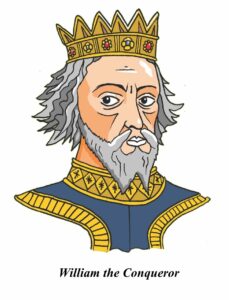On September 7th 1087 William the Conqueror died in Rouen, but why Rouen?
Even though he had conquered England, he was also Duke of Normandy and he had to spend more time in France protecting his kingdom in Normandy than he did here. In fact, it’s reported that at one point he spent five years out of the country. He seemed to be continually fighting, just to keep control of his kingdom of Normandy.
 Once he had won the Battle of Hastings, he came up with a radicle change and developed what grew into what we now call, the Feudal system. Basically, he controlled England by being ruthless and this is the important bit, he bribed his soldiers. He did this by giving them profitable lands, and in return they had to supply him with soldiers when he needed them. He then expected them to control their areas as ruthlessly as was needed, and that is exactly what they did. This was initially resisted by uprisings across the country, but William and his barons mercilessly put them all down.
Once he had won the Battle of Hastings, he came up with a radicle change and developed what grew into what we now call, the Feudal system. Basically, he controlled England by being ruthless and this is the important bit, he bribed his soldiers. He did this by giving them profitable lands, and in return they had to supply him with soldiers when he needed them. He then expected them to control their areas as ruthlessly as was needed, and that is exactly what they did. This was initially resisted by uprisings across the country, but William and his barons mercilessly put them all down.
Then, for the first time ever to make certain he knew who owned what, he created a record of all the land owned in England. You may have heard of it; it was called the Doomsday book.
Why was he in Rouen, and why wasn’t he buried in England?
Well, in 1087, at 59, having ruled England for twenty-one years and Normandy for thirty-one, he was once more in France. He had gone there this time to recover three towns that Phillip, the King of France, had taken. Again, there were a series of vicious battles. By July that year he was attacking the French town of Mantes, when he collapsed, they all thought he was suffering from heat exhaustion. They were wrong, it was more serious than that, so William decided to go back to his French capital at Rouen. Unfortunately, his condition continued to worsen, begging those to pray for him, he confessed his sins and sought pardon from God. He gave his treasure to the churches and the poor, “so that what I amassed through evil deeds may be assigned to the holy uses of good men.” Gifts also were sent as penitence to the clergy at Mantes so that they might restore the churches William’s army had burned.
He was surrounded by bishops, abbots, monks, and physicians but not his eldest son, Robert, as four years earlier he had joined with king of France. Neither, was his half brother, Odo, the bishop of Bayeux, who was currently was in prison for treason. On his death bed William forgave them both. Odo was released and Robert, became the Dukeof Normandy. Interestingly it was to his younger son, William, that he gave the throne of England.
Therefore,would you belive it the conqueror of England died, in France!
1066 – The Battle of Hastings the Musical
To tell your children about the Battle of Hastings, his invasion of England and how he won it, our sister site Educational Musicals have published a musical 1066 – The Battle of Hastings. Click on 1066 – The Battle of Hastings which takes you to the show, where you can read two pages of script and hear two of the songs.
Isn’t history fun?
Ten questions to discuss:
- Why did William the Conqueror spend considerable time in Rouen, France, despite being the King of England?
- What challenges did William face in maintaining control over his kingdom in Normandy?
- How did William the Conqueror establish and maintain control over England after the Battle of Hastings?
- What significant change did William introduce in England, which evolved into the Feudal system?
- How did William deal with uprisings against his rule in England?
- What was the purpose and significance of the Domesday Book created by William?
- Why did William travel to Rouen in 1087, and what events led to his death there?
- Who surrounded William the Conqueror during his final days in Rouen, and why were some key figures absent?
- How did William distribute his wealth and seek forgiveness before his death?
- Why was it significant that William the Conqueror, the ruler of England, died in France rather than in his English kingdom?
For more information on William the Conqueror:
https://www.britannica.com/biography/William-I-king-of-England
https://snippetsofparis.com/william-the-conqueror/
© Tony Dalton


